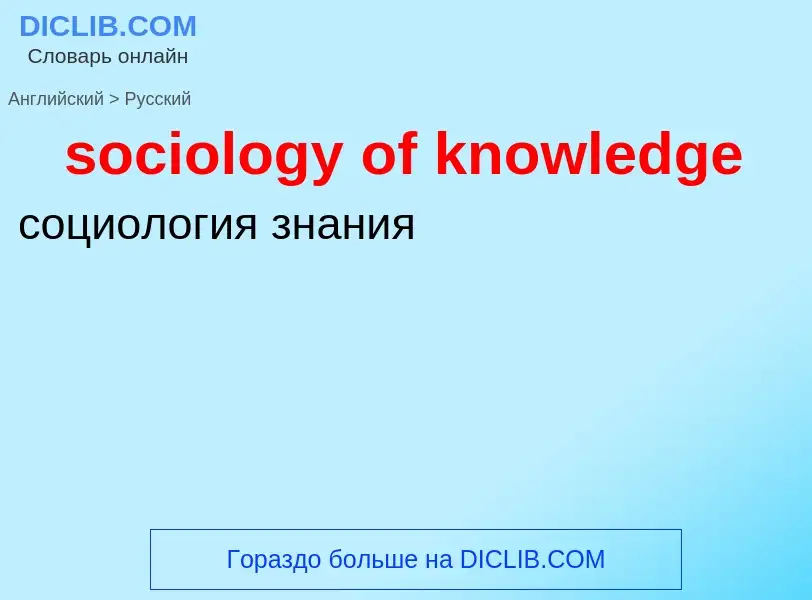Перевод и анализ слов искусственным интеллектом ChatGPT
На этой странице Вы можете получить подробный анализ слова или словосочетания, произведенный с помощью лучшей на сегодняшний день технологии искусственного интеллекта:
- как употребляется слово
- частота употребления
- используется оно чаще в устной или письменной речи
- варианты перевода слова
- примеры употребления (несколько фраз с переводом)
- этимология
sociology of knowledge - перевод на русский
[səusiə'lɔdʒik-{səusiə'lɔdʒik}(ə)l]
общая лексика
социологический
прилагательное
общая лексика
социологический
Определение
.
Википедия

The sociology of knowledge is the study of the relationship between human thought and the social context within which it arises and the effects that prevailing ideas have on societies. It is not a specialized area of sociology. Instead, it deals with broad fundamental questions about the extent and limits of social influences on individuals' lives and the social-cultural basis of our knowledge about the world. The sociology of knowledge has a subclass and a compliment. Its subclass is Sociology of scientific knowledge. Its complement is the sociology of ignorance.
The sociology of knowledge was pioneered primarily by the sociologist Émile Durkheim at the beginning of the 20th century. His work deals directly with how conceptual thought, language, and logic can be influenced by the societal milieu in which they arise. The 1903 essay Primitive Classification, by Durkheim and Marcel Mauss, invoked "primitive" group mythology to argue that classification systems are collectively based and that the divisions within these systems derive from social categories. In his 1912, The Elementary Forms of the Religious Life, Durkheim elaborated on his theory of knowledge. In this work, he examined how languages, concepts, and the categories (such as space and time) used in logical thought have a sociological origin. Neither Durkheim nor Mauss specifically coined the term "sociology of knowledge". However, their work was an exceptional contribution to the subject.
The widespread use of the term 'sociology of knowledge' emerged in the 1920s, when several German-speaking sociologists, most notably Max Scheler and Karl Mannheim, wrote extensively on sociological aspects of knowledge. This was followed in 1937 by a much-cited survey of the subject by Robert K. Merton, the American sociologist, 'The sociology of knowledge'. With the dominance of functionalism through the middle years of the 20th century, the sociology of knowledge remained on the periphery of mainstream sociological thought. However, it was reinvented and applied closely to everyday life in the 1960s, particularly by Peter L. Berger and Thomas Luckmann in The Social Construction of Reality (1966). It is still central for methods dealing with a qualitative understanding of human society (compare socially constructed reality). The 'genealogical' and 'archaeological' studies of Michel Foucault are of considerable contemporary influence.



![Mother and children, [[Mahabalipuram]] Mother and children, [[Mahabalipuram]]](https://commons.wikimedia.org/wiki/Special:FilePath/Mother and children. Mahabalipuram.jpg?width=200)

.jpg?width=200)



![Physician in [[Ancient Greece]] treating a patient 480–470 BC Physician in [[Ancient Greece]] treating a patient 480–470 BC](https://commons.wikimedia.org/wiki/Special:FilePath/Medicine aryballos Louvre CA1989-2183.jpg?width=200)
![[[Max Horkheimer]] (left, front), [[Theodor Adorno]] (right, front), and [[Jürgen Habermas]] (right, back), 1965 [[Max Horkheimer]] (left, front), [[Theodor Adorno]] (right, front), and [[Jürgen Habermas]] (right, back), 1965](https://commons.wikimedia.org/wiki/Special:FilePath/AdornoHorkheimerHabermasbyJeremyJShapiro2.png?width=200)

![[[Auguste Comte]] (1798–1857) [[Auguste Comte]] (1798–1857)](https://commons.wikimedia.org/wiki/Special:FilePath/Auguste Comte2.jpg?width=200)
![[[Émile Durkheim]] [[Émile Durkheim]]](https://commons.wikimedia.org/wiki/Special:FilePath/Emile Durkheim.jpg?width=200)
![Bust]] of [[Ferdinand Tönnies]] in [[Husum]], Germany Bust]] of [[Ferdinand Tönnies]] in [[Husum]], Germany](https://commons.wikimedia.org/wiki/Special:FilePath/Ferdinand Toennies Bueste Husum-Ausschnitt.jpg?width=200)
![[[Harrison White]] [[Harrison White]]](https://commons.wikimedia.org/wiki/Special:FilePath/Harrisonwhite.jpg?width=200)
![[[Ibn Khaldun]] statue in [[Tunis]], [[Tunisia]] (1332–1406) [[Ibn Khaldun]] statue in [[Tunis]], [[Tunisia]] (1332–1406)](https://commons.wikimedia.org/wiki/Special:FilePath/Ibn Khaldoun-Kassus.jpg?width=200)
![[[Jürgen Habermas]] [[Jürgen Habermas]]](https://commons.wikimedia.org/wiki/Special:FilePath/JuergenHabermas.jpg?width=200)
![[[Karl Marx]] (1818–1883) [[Karl Marx]] (1818–1883)](https://commons.wikimedia.org/wiki/Special:FilePath/Karl Marx.jpg?width=200)
![[[Max Weber]] [[Max Weber]]](https://commons.wikimedia.org/wiki/Special:FilePath/Max Weber 1894.jpg?width=200)
![The normal distribution is important in many fields of science, not just the [[social sciences]]}} The normal distribution is important in many fields of science, not just the [[social sciences]]}}](https://commons.wikimedia.org/wiki/Special:FilePath/Planche de Galton.jpg?width=200)
![A [[social network]] diagram: individuals (or 'nodes') connected by relationships A [[social network]] diagram: individuals (or 'nodes') connected by relationships](https://commons.wikimedia.org/wiki/Special:FilePath/Sna large.png?width=200)
![[[Herbert Spencer]] (1820–1903) [[Herbert Spencer]] (1820–1903)](https://commons.wikimedia.org/wiki/Special:FilePath/Spencer-detail.png?width=200)
![homefront]] and a departure from [[gender roles]] due to wartime necessity. homefront]] and a departure from [[gender roles]] due to wartime necessity.](https://commons.wikimedia.org/wiki/Special:FilePath/WomanFactory1940s.jpg?width=200)
.jpg?width=200)

![[[Leon Petrazycki]] [[Leon Petrazycki]]](https://commons.wikimedia.org/wiki/Special:FilePath/Leon Petrazycki ii.jpg?width=200)
![[[Max Weber]] [[Max Weber]]](https://commons.wikimedia.org/wiki/Special:FilePath/Veber.jpg?width=200)
